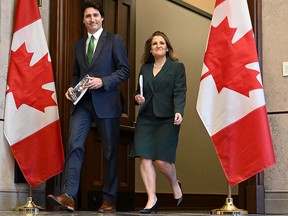
All Canadians have a stake in Ottawa keeping a tight rein on the federal budget, says economist

Article content

The federal government tables its 2024 budget today, and according to one economist, Canadians should pay attention because we all have a stake in Ottawa keeping a tight rein on its finances.
Article content
Finance Minister Chrystia Freeland has promised to keep deficits under control, with shortfalls around $40 billion for this fiscal year and the next two. The plan is to cap deficits near 1 per cent of nominal gross domestic product, starting in 2026-2027.
Advertisement 2
Article content
But recent provincial budgets have shown how difficult keeping to such so-called fiscal anchors can be, says Rachel Battaglia, an economist with Royal Bank of Canada. Straying from them can hit a government’s credibility and make borrowing more expensive.
Take Quebec, for example.
The provincial budget released March 12 projected deeper budget deficits over the next six years and delayed its plan to return to balance in 2029-30.
The bond market quickly priced in the province’s growing borrowing requirements and deteriorating fiscal outlook, bringing the spread between Ontario and Quebec 10-year bond yields to their highest differential in over a year, said Battaglia.
“As a result, the Quebec government will, once again, pay more to service its debt relative to Ontario,” she said.
The federal government would be wise to mark the developments in Quebec to avoid a similar reaction from bond markets, she said.
Canada goes into the budget with a strong sovereign rating, but RBC says key metrics show it is the most vulnerable compared to other AAA rated economies.
Article content
Advertisement 3
Article content
“This suggests Canada is at a greater risk of a downgrade than other top-rated peers,” said Battaglia.
Why should this matter to average Canadians?
Battaglia says even though these might seem like “distant problems,” the impact from the global stage can trickle all the way down to Canadian households and businesses.
Canada’s sovereign rating not only affects the borrowing rates of the federal government but also of provincial governments and the country’s big banks.
What Canadian lenders charge customers for mortgages and other loans is closely correlated to the sovereign’s borrowing rate, she said.
“Therefore, all Canadians have a stake in seeing the federal government meet its fiscal targets,” said Battaglia. “We hope Ottawa shows fiscal discipline.”
Sign up here to get Posthaste delivered straight to your inbox.

Today’s chart shows just how daunting Ottawa’s plan to build 3.87 million new homes by 2031 will be, says National Bank of Canada economist Stéfane Marion.
The task entails 550,000 housing starts a year, double the record number of 270,000 in 2021, which will take a lot more construction workers than Canada has now, said Marion.
Advertisement 4
Article content
“That’s going to be a VERY tall order,” said the economist, because almost 8 per cent of the country’s workforce is already employed in construction, the highest percentage since 1946.
“As an economist, our job is to maximize an outcome under a set of constraints. We’re not sure Ottawa has properly assessed the labour constraints of building a record number of homes by 2031,” he said.
- Finance minister Chrystia Freeland tables 2024 federal budget
- Fireside Chat with Bank of Canada governor Tiff Macklem at Wilson Center, Washington D.C. amid the IMF and World Bank spring meetings. The Wilson Center is hosting the launch of the Canada Institute Washington Forum on the Canadian Economy, co-chaired by former Canadian Finance Minister Bill Morneau and former Federal Reserve Vice Chair for Supervision Randal Quarles.
- The Bank of Canada and economists will be watching the latest inflation reading this morning. The consumer price index has been cooling in recent months, dropping within the central bank’s target range in January and February.
- Bank of Montreal annual general meeting
- Today’s Data: Canada housing starts, United States building permits, industrial production and capacity utilization
- Earnings: Bank of NY Mellon Corp, PNC Financial Services Group, Johnson & Johnson, Bank of America Corp, UnitedHealth, Morgan Stanley, United Airlines Holdings Inc
Advertisement 5
Article content

Every person, company and interest group has something they want the federal government to offer, or repeal, in the budget today. Few are as insightful as tax expert Jamie Golombek, who offers three changes related to personal finance issues he’d like to see.
Recommended from Editorial
Are you worried about having enough for retirement? Do you need to adjust your portfolio? Are you wondering how to make ends meet? Drop us a line at aholloway@postmedia.com with your contact info and the general gist of your problem and we’ll try to find some experts to help you out while writing a Family Finance story about it (we’ll keep your name out of it, of course). If you have a simpler question, the crack team at FP Answers led by Julie Cazzin or one of our columnists can give it a shot.
Advertisement 6
Article content
McLister on Mortgages
Want to learn more about mortgages? Mortgage strategist Robert McLister’s Financial Post column can help navigate the complex sector, from the latest trends to financing opportunities you won’t want to miss. Read them here
Today’s Posthaste was written by Pamela Heaven with additional reporting from Financial Post staff, The Canadian Press and Bloomberg.
Have a story idea, pitch, embargoed report, or a suggestion for this newsletter? Email us at posthaste@postmedia.com.
Bookmark our website and support our journalism: Don’t miss the business news you need to know — add financialpost.com to your bookmarks and sign up for our newsletters here.
Article content






